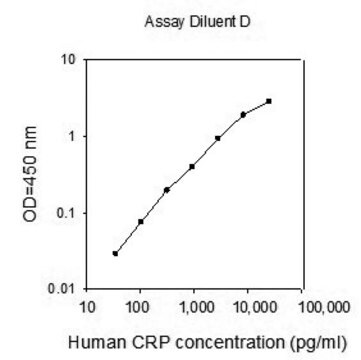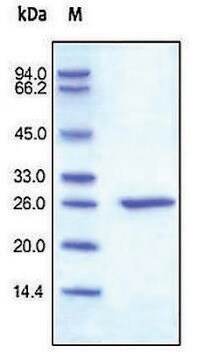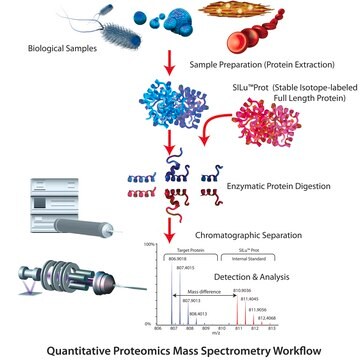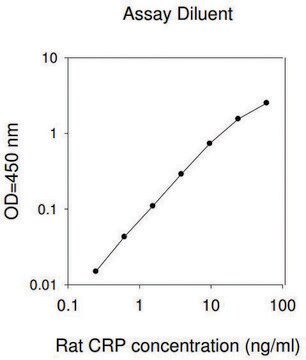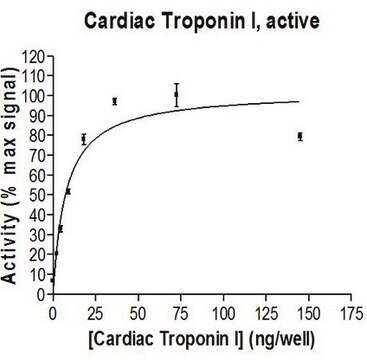AG723-M
C-Reactive Protein
Sinonimo/i:
CRP
Autenticatiper visualizzare i prezzi riservati alla tua organizzazione & contrattuali
About This Item
Codice UNSPSC:
12352202
eCl@ss:
32160405
NACRES:
NA.41
Prodotti consigliati
Origine biologica
human
Livello qualitativo
100
300
Saggio
>98% (SDS-PAGE)
Stato
liquid
Produttore/marchio commerciale
Chemicon®
Concentrazione
3.5 mg/mL
N° accesso NCBI
N° accesso UniProt
Descrizione generale
C-reactive protein (CRP) is a homopentameric acute-phase inflammatory protein, which belongs to the pentraxin family. It is a highly conserved plasma protein produced mainly in liver hepatocytes. It is also synthesized by lymphocytes, smooth muscle cells, macrophages, endothelial cells, and adipocytes.
Applicazioni
C-reactive protein (CRP) has been used:
- as a model analyte for interference-reduced detection of CRP in serum using non-competitive sandwich immunoassay in combination with surface plasmon field-enhanced fluorescence spectroscopy (SPFS)
- to determine the involvement of collectin placenta 1 (CL-P1) in CRP-mediated complement activation and to investigate the downstream effects of this complement activation
- to examine to study the effects of lectin-like oxidized low-density lipoprotein receptor 1 (LOX-1) on CRP-induced complement activation by interacting with CRP to develop an inflammatory pathogenic response
Azioni biochim/fisiol
C-reactive protein (CRP) plays a vital role in the complement pathway, apoptosis, phagocytosis, nitric oxide (NO) release. It also regulates the production of interleukin-6 and tumor necrosis factor-α. Patients suffering from appendicitis, cholecystitis, pancreatitis, and meningitis have elevated levels of CRP. CRP facilitates the uptake of low-density lipoprotein in macrophages. It has a crucial role in the pathophysiology of cardiovascular disease, which makes it a useful marker for inflammation and cardiovascular events.
Qualità
No precipitin bands when tested at 2 mg/mL against anti-whole human serum.
Stato fisico
Liquid in 100mM NaCl, 10mM Tris-HCl with 0.1% sodium azide, 2mM CaCl2
Stoccaggio e stabilità
Maintain under sterile conditions at 2-8°C for up to one year. Do not freeze. Full safety precautions should be taken as in the handling of any potentially infective body fluid.
Note legali
CHEMICON is a registered trademark of Merck KGaA, Darmstadt, Germany
Codice della classe di stoccaggio
12 - Non Combustible Liquids
Classe di pericolosità dell'acqua (WGK)
nwg
Punto d’infiammabilità (°F)
Not applicable
Punto d’infiammabilità (°C)
Not applicable
Certificati d'analisi (COA)
Cerca il Certificati d'analisi (COA) digitando il numero di lotto/batch corrispondente. I numeri di lotto o di batch sono stampati sull'etichetta dei prodotti dopo la parola ‘Lotto’ o ‘Batch’.
Possiedi già questo prodotto?
I documenti relativi ai prodotti acquistati recentemente sono disponibili nell’Archivio dei documenti.
I clienti hanno visto anche
Lectin-like Oxidized LDL Receptor 1 Is Involved in CRP-Mediated Complement Activation.
Fujita Y, Yamaguchi S, Kakino A, Iwamoto S, Yoshimoto R, Sawamura T.
Clinical Chemistry null
Yoshiko Fujita et al.
Clinical chemistry, 56(3), 478-481 (2010-01-16)
C-reactive protein (CRP) increases in response to inflammation and is purported to be a risk factor for atherogenesis. We recently demonstrated that a scavenger receptor, lectin-like oxidized LDL receptor (LOX-1), is a receptor for CRP. In light of the overlapping
Charles R Kiefer et al.
Clinica chimica acta; international journal of clinical chemistry, 413(19-20), 1536-1541 (2012-06-28)
We evaluated the utility of an independent biomarker of early ischemic cellular damage-circulating fractional forms of C-reactive protein (fracCRP), to verify the diagnostic relevance of low Troponin I (TnI) values within the context of a workup for Acute Coronary Syndrome
Nitai Roy et al.
Biochimica et biophysica acta, 1860(6), 1118-1128 (2016-03-01)
C-reactive protein (CRP) is a plasma pentraxin family protein that is massively induced as part of the innate immune response to infection and tissue injury. CRP and other pentraxin proteins can activate a complement pathway through C1q, collectins, or on
Safaa I Khater et al.
Biomedicines, 10(7) (2022-07-28)
Oxidative stress is considered the main etiologic factor involved in inflammatory bowel disease (IBD). Integration of nanocarriers for natural therapeutic agents with antioxidant and anti-inflammatory potential is a novel promising candidate for curing IBD. Herein, the colonic antioxidant and anti-inflammatory
Il team dei nostri ricercatori vanta grande esperienza in tutte le aree della ricerca quali Life Science, scienza dei materiali, sintesi chimica, cromatografia, discipline analitiche, ecc..
Contatta l'Assistenza Tecnica.
